Scotland Editor
BBC Scotland News
 BBC
BBCThe former owner of Rangers, Sir David Murray, apologized to the fans for his role in the financial disaster that has been in the club for more than a decade.
Sir David, who sold the IBROX team for 1 pounds to businessman Craig White, headed on IBrox when the club gave 47 million pounds in tax -exempt loans for players and employees between 2001 and 2010.
Under the ownership of Mr. White, Rangers entered the liquidation in 2012 – after a year of sale.
In a large -scale interview with the BBC to celebrate the publication of his autobiography, Sir David said he regretted his decisions and said sorry for the fans and club staff.
“Of course I will apologize,” he said. “I am not one of these people who run a company and hide.
“It was a terrible moment, and I apologize to all the employees and good people, and I know many of them to this day.
“I hope it is too late, they look at the facts and think I have been in a very difficult situation.”
What were the facts?
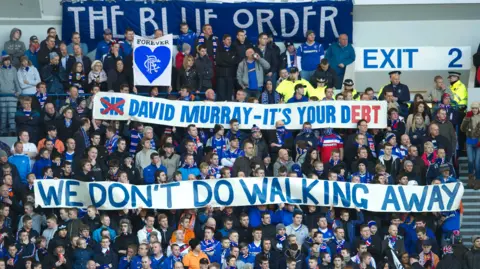 SNS
SNSWhat was known as the “large tax condition” that focuses on the use of the EBTS employee club (EBTS).
The EBTS, which was also used by other clubs, enabled Rangers to pay 47 million pounds for players, managers and managers between 2001 and 2010 in tax exempt loans.
HMRC argued that payments were profits and should be taxable.
In 2012 and 2014 it was previously found in favor of Rangers, but the Supreme Court ruled in favor of HMRC after an appeal in 2015.
The case was revealed against the background of the financial collapse of Rangers.
Years later, Mr. White was accused and cleared of seizing the club fraud.
A court heard that his seizure of Rangers had been closed in a metal currency that was thrown at a table in the Sir David office.
At that time, Mr. White agreed to take over the obligations that included paying a bank debt worth 18 million pounds and 5 million pounds for the players.
Sir David denied the failure to implement the due care for Mr. White, saying: “I went to the facts in front of me.”
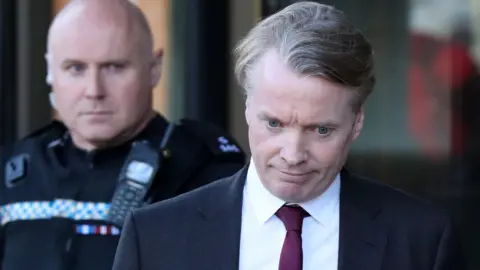 The media of the Palestinian Authority
The media of the Palestinian AuthoritySir David, Sir David, replied: “They did nothing illegal about whether it was morally acceptable to deprive NHS and other public services for money so that the millionaire football players can pay a lower tax,” they did nothing illegal. “
“Football players have got their salaries too much. Not only in Rangers, everywhere,” adding: “It is avoiding. People do that.”
Sir David denied that the awards that Rangers won during this period were contaminated with tax arrangements and also denied that the plan was a success in buying success, or financial stimulants.
He replied, “Not at all,” adding: “It has been proven in the end that he was not an illegal tax plan.”
Sectarianism, Steel and Mr. Sean Connery
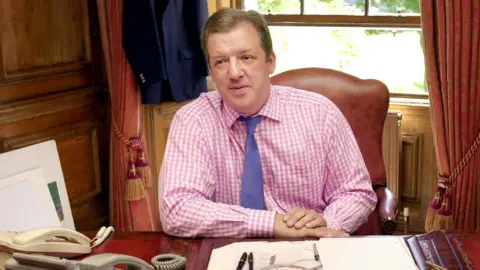 The media of the Palestinian Authority
The media of the Palestinian AuthoritySir David made his names in the steel industry, as Murray International Metals formed limited at the age of 23.
In 1988, Rangers bought for 6 million pounds and continued to see the victory club 15 league championships and 20 cups of local.
He and the director of Grame Sounds signed the first high -level Catholic player since the Second World War – MOHNSTON, who previously played with CELTIC – in 1989.
Thinking about sectarian tensions in Glasgow, which he described in his book as “Vitriol”, Sir David said that the continued singing of sectarian songs in IBrox was not acceptable.
“There is no place for that in society,” he said. “I don't think this is true and I said that and I lost some support of Rangers fans by saying.”
The BBC also told Scotland News a proposal presented by the media pole Robert Maxwell in a phone call one day.
“I am thinking about buying Celtic, we can put Rangers and Seltik together as one and they will be a great power.
“I said I don't think you know the scenario here, I don't think it is practical and I do not think it will succeed.”
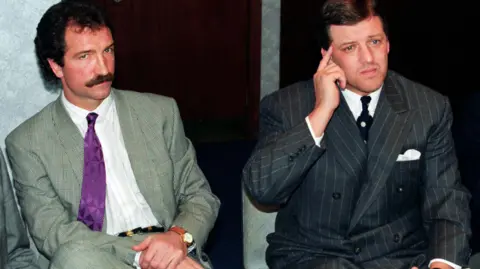 SNS
SNSThe businessman also called for an investigation into the participation of the Scottish government in selling two steel processing factories in Lanarkshire to Tycooon Sanjeev Gupta.
The sale was supported by a support package of 7 million pounds from the Scottish government.
Sir David claims that the ministers have refused to try to compete with the business because it is likely to be incompatible with government aid rules, and the administration of Mr. Gupta Liberty Steel criticized in the years that followed.
The Scottish government “acted quickly” to support treatment, adding: “This intervention maintains more than 100 jobs in Dalzil and maintains the ability of the steel industry in Scotland.”
Sir David was also criticizing the industrial policies of both Scottish governments and the United Kingdom, saying: “It is ridiculous that Britain does not have the ability to make a steel plate to defend it.”
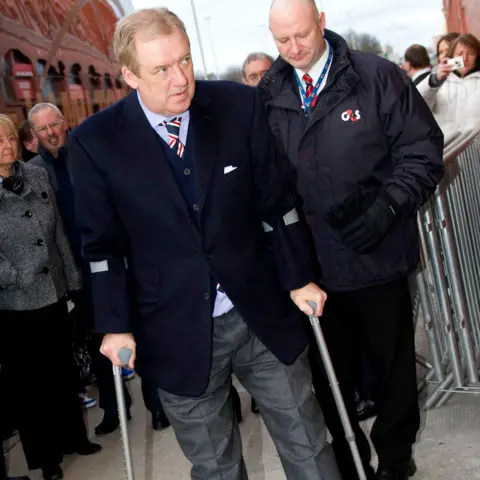 SNS
SNSElsewhere in his book, Sir David describes in detail the car accident in 1976, which led to amputation of his legs at the age of 24, a year after the establishment of his work in the field of minerals.
On his way to the home from the Rakhbi game in Lotus from the fiberglass, it was sent by the road tires explosion to a tree.
Sir David described how his fellow rugby players stopped helping him, using their relationships as relationships before he was transferred to the hospital for surgery to save life.
“None of us knows how difficult we are until the time we discovered how difficult,” he said.
“I had a young son for several months and a two -year -old boy. I was a young wife. My father had just died. I could only go in one direction. I couldn't fail. I have responsibility.”
Another chapter is dedicated to the CV of Mr. Sean Connery, who was an intimate friend of Mr. David.
The book describes how the husband traveled to Dunblan in the wake of the killing of 16 children and their teacher in the Scottish city on March 13, 1996.
“After terrible news there, Sean wanted to visit him,” said Sir David.
“It was such a patriot, Sean. He took care of Scotland every day and just wanted to be there.”




